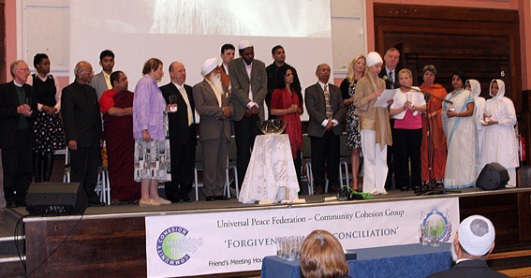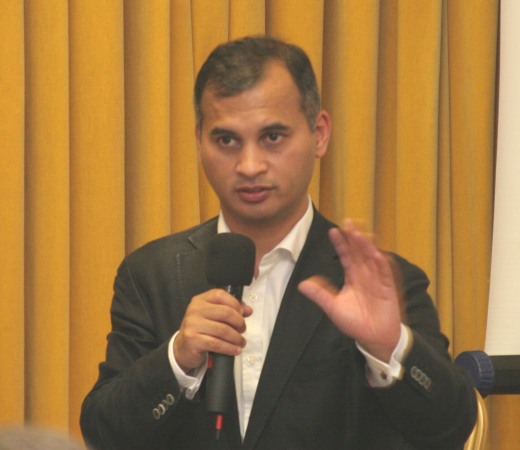Green Economy Initiative

Universal Peace Federation
UPF-UK Environment Chapter
Understanding Copenhagen 2009: Community Leaders Awareness & Debate
Lawrence Bloom
Chairman, UNEP, Green Economy Initiative
Green Cities, Buildings and Transport.
6:30 pm 3rd September 2009, 43 Lancaster Gate, W2 3NA

Lawrence Bloom
and
Murad Qureshi, Assembly Member
Chair of the Environment Committee
London Assembly, Greater London Authority
You are cordially welcome to a consideration and discussion of the issues surrounding climate change from 6:30 pm on September 3rd at 43 Lancaster Gate. There are major negotiations ongoing that may affect our lives substantially from December 2009
UPF is organising a series of conferences to answer questions, promote discussion and bring awareness to the grass roots through community and interfaith leaders. UPF has been active in the area of community coherence, multi-cultural and interfaith and we want to mobilize our network of leaders in understanding environmental, renewable issues in view of the upcoming “Copenhagen 2009 Climate Change Conference” in December.
Lawrence Bloom is a chairman of the World Economic Forum, Global Agenda Council on Urban Development, Davos, and Chairman UNEP, Green Economy Initiative, Green Cities, Buildings and Transport.
‘’As world leaders search for creative solutions to restore global equilibrium, the opportunity for recognising the importance of both human and environmental capital has perhaps never been so possible or achievable’’ www.lawrencebloom.com.c
Murad Qureshi AM was an Executive Committee member of SERA (1994-2000) campaigning on green issues throughout the 1990s. He is especially keen on promoting the use of renewables as an alternative energy source and on promoting energy efficiency initiatives to deal with fuel poverty.
Kindly RVSP to reserve your place. There will be a small charge for refreshments. Click here for travel information.
Kind regards,
Dr Marios Gerogiokas
UPF-UK Environment Chapter
075 0789 3739
Mr. Muftah Benomran
Noble Cities Plc
www.noblecities.com
Reclaiming tomorrow…
‘We are one brief generation in the long march of time; the future is not ours to erase.’
David Suzuki Foundation
‘I have seen the future, and it won’t work’
Paul Krugman, New York Times[1]
he chilling accuracy of Paul Krugman’s observation was recently confirmed in a Massachusetts Institute of Technology (MIT) review of more than 10 different future scenarios, including those from the Intergovernmental Panel on Climate Change (IPCC) and Royal Dutch Shell.
Of those, the MIT study concluded that Shell’s ‘Blueprints’ scenario resulted in the lowest realistically achievable CO2 emissions levels, because it was based on the rapid implementation of advanced technologies and energy efficiency initiatives, and involved a highly effective collaboration between government, industry, international institutions, NGOs and academia.
Even then CO2 levels would stabilize at around 650ppm…yet 450ppm is currently accepted as the viable maximum.
We now understand that at this level various serious trigger points and feedback loops start operating. Not least of these is the acidification of the oceans, causing them to become a net emitter of CO2 rather than a sink. These increasing CO2 levels then feed back into higher temperatures, accelerating both ice melt at the poles and the melting of tundra ice with its consequent release of methane.
So the evidence indicates that we cannot rely on technology alone to ensure our survival. ‘Business as usual’ is not an option – much more needs to be done to raise awareness and change our behaviour. The Blueprints scenario gives us a five-year window. We must act now!
Arguably the biggest obstacle to this critical change is the absence of public engagement toward the urgency of our predicament, resulting in a lack of any real commitment to carbon reduction.
In line with Einstein’s observation that ‘No problem can be resolved at the same level of thinking that created it’, I believe that only a world-class lifestyle behaviour change programme could take us through this next challenging period with a realistic prospect of minimizing its impacts on human survival and well-being.
Such a lifestyle change delivery programme will, in essence:
- Be a community-based ‘bottom up’ process;
- Local authorities and corporations will become an effective delivery mechanism for empowering and resourcing their communities and employees to create eco-neighbourhood community groups;
- These groups will be imbued with the vision, role models, tools, implementation procedures, skill sets, and underpinning supportive structures to enable both visible and tangible success; and
- Each individual will feel that their contribution has value and their drop is helping to ‘fill the bucket’.
Galvanizing communities around the world to work for their future in this way creates a dynamic shift, and with it real hope of significant change from our present trajectory.
Without such a change, the research demonstrates that technology alone will not save us.
Charles Darwin warned: ‘It is not the strongest of the species that survives, nor the most intelligent, but the one most responsive to change.’
So if we are to survive, evolution demands we each recognise that:
- We were mistaken in thinking we could go on exploiting the planet’s resources and ‘fouling our own nest’ with impunity; and
- The time has come to take our next evolutionary step as a species.
This step is to respond to the present crisis by releasing from within ourselves a deeper understanding of our relationship with each other and the planet that gives us life.
As a society we are in the process of moving from the adolescent stage of ‘in reaction to’ to the more adult stage of ‘in relationship with’. The economic models of the adolescent stage no longer serve us. In the same way that the skill in a space shot is to know when to blow the explosive bolts, releasing the booster rockets and allowing them to fall away, so we must blow the symbolic bolts connecting us to outmoded thinking. The boosters have a specific function, to enable the craft to escape the earth’s atmosphere and gravitational pull. Our current systems have enabled us to enrich and empower two billion of our species, but they can take us no further.
We must now change course from a fiercely competitive win/lose system to a collaborative win/win scenario, where humanity shares all its knowledge of what is and what is not working for the benefit of the whole, at both local and global levels.
Each human being, simply by virtue of their human birth, has the right to clean water, nutritious food, proper shelter, access to education, to healthcare, to justice and financial resources. These priorities are only sustainable in a healthy, natural environment, supported by a viable economic system and an environmental Bill of Rights.
While these universal values are not prioritised by our present economic system, they appear unattainable. However, once we prioritise them, we can build a new resilience within the current economic model, supporting it by authorising and encouraging the widespread use of community and other complementary currencies.
We will need to evolve a critical mass of people from all sectors of society, our private and public institutions, communities and individuals, coalescing around this recognition of the need for a dramatic change in our values. It should, however, be possible when we realise that it is only people that make up our institutions, and people have the capacity to change
Humanity is the result of five billion years of earth’s evolution. We will discover, within the next five years, whether we are still a viable species. If we cannot engage behaviour change at this scale, we will have failed the ‘intelligence test’ that evolution requires us to answer. The rewards for success are beyond our wildest dreams – but the penalties for failure surpass our worst nightmares.
Now is the moment for us to ‘be the change’[2] we wish to see in the world.
Lawrence Bloom
Chairman
World Economic Forum
Global Agenda Council on Urban Development,
Davos, Switzerland.
Deputy Chairman, Noble Cities Plc, UK
Chairman, Green Cities, Buildings and Transport Panel, Green Economy Initiative, United Nations Environmental Programme (UNEP), Switzerland
www.lawrencebloom.com
[1] Paul Krugman, Professor of Economics and International Affairs at Princeton University, was awarded the 2008 Nobel Memorial Prize in Economic Sciences.
[2] You must be the change you wish to see in the world. Mohandas K. Gandhi

















 A lively panel Q&A session followed the speaker presentations, and the proceedings concluded with the generous donation of a large cheque by the Sabrang Ladies Group to UPF for improvement of the furnishings in the Peace Embassy.
A lively panel Q&A session followed the speaker presentations, and the proceedings concluded with the generous donation of a large cheque by the Sabrang Ladies Group to UPF for improvement of the furnishings in the Peace Embassy.
































